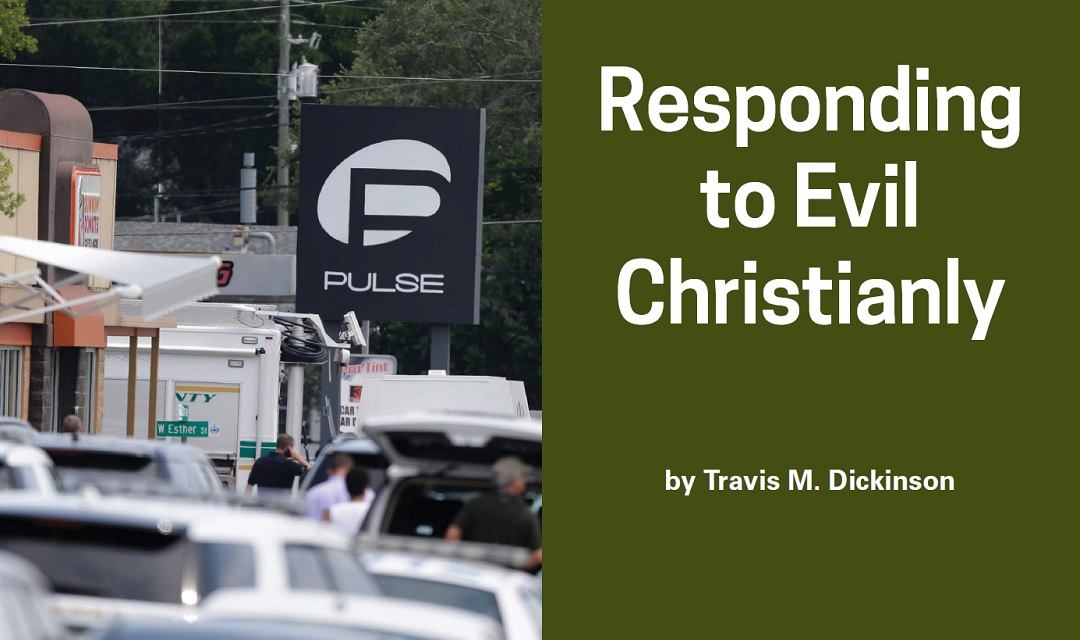This article first appeared in the Christian Research Journal, volume 39, number 06 (2016). The full text of this article in PDF format can be obtained by clicking here. For more information about the Christian Research Journal, click here.
In the early morning hours of June 12, 2016, Omar Mateen approached an LGBT nightclub in Orlando, Florida, with the intent to kill as many people as possible. He pledged allegiance to the Islamic State and proceeded to open fire on a highly populated and tragically well-contained nightclub. The attack left forty-nine people dead and fifty-three injured. It is considered the largest mass shooting in the United States in contemporary times. Prior to this, the shooting with the largest death toll was the Virginia Tech shooting in 2007, where thirty-two were killed and seventeen injured. The Orlando shooting was significantly worse than anything of this kind in the past century.
Given the intrigue, the nation took notice, at least for a few moments. In one interview, a popular conservative TV personality emphatically identified Mateen as evil. The interviewer then asked, “What is the proper response to evil?” His answer: “Destroy it. Confront it. You don’t contain evil, because you can’t. You destroy evil. ISIS is evil, and Mateen is evil.”
In a recent New York Times article, Episcopal priest Steven Paulikas took issue with these remarks. Paulikas argues that “the notion that evil can be ‘destroyed’ is an ethical version of a fool’s errand.” In fact, Paulikas thinks that “violence is the surest outcome of blithely ascribing the quality of evil to another.” His thought seems to be that when we come to think of someone or some institution as specifically “evil,” this motivates us to oppose that person or institution violently, whether justified or unjustified. For if someone or some group is evil, then we will likely do whatever it requires to take them out, no matter the collateral damage.
THE MYTH OF EVIL?
Paulikas thinks there is a better response, one he has adopted from French philosopher and theologian Paul Ricoeur. Paulikas says, “Ricoeur agrees with many other thinkers that evil is not a thing per se…For Ricoeur, we conceive of evil through the realm of myth, or grand narratives that express common human experience. Myth is not false; rather, it encapsulates truth about subjects like evil that cannot be perceived fully through reason alone.”
What is meant by “myth” in this context? The word myth is a slippery term. In its common usage, to say that some account is a myth is to say that it is literally false (and probably fanciful). But in a more technical sense, myth is a way to talk about reality when that reality is not easily describable in literal terms. This is similar to the way we use metaphors. In William Shakespeare’s play Romeo and Juliet, Romeo says, “What light through yonder window breaks? It is the east, and Juliet is the sun.” We don’t react to this line by saying that Romeo has said something false. No one says indignantly, “C’mon, Romeo. Juliet is not a giant ball of burning gas.” Instead, we understand that Romeo has said something deep and beautiful and, in the context of the play, we should notice, it is true, even if not in the literal sense of the words. The idea is that Juliet is, to Romeo, exemplifying a quality of beauty and radiance such that literal description would fall short. Myth is like this, though myth is typically applied on the level of worldview and the basic categories of reality.
Evil as Metaphor
When Paulikas says that we should understand evil in the realm of myth, he means to put it beyond our literal discourse. He’s not denying its existence (at least, not completely). But he is denying its obviousness. That is, evil is not some kind of obvious feature out there in the world that we simply can track down and destroy. It’s much more complicated and subjectively understood. In fact, disparate myths with different symbols can describe the very same reality. Likewise, Romeo could have used a different metaphor to talk about Juliet’s radiant beauty, and it’s not like one would be true and the other false. Myths tolerate pluralism in a way that literal descriptions do not.
FROM THE ABUSER TO THE ABUSED
If evil is in the realm of myth, the argument seems to be that we should give up trying to crusade against it. Instead, Paulikas thinks, we should focus on a response in the face of evil. He says, “In the common conception, solutions to evil require retribution, and the most obvious way to achieve retribution is through violence. Responses, on the other hand, engender what Ricoeur calls ‘wisdom,’ an unwavering commitment to relieve and prevent suffering. Any violence used in a response to evil would, therefore, be focused on the alleviation of suffering rather than the attempt to stamp out evil where we think we see it.”
He opines that our many, many efforts at retaliatory violence against evil have not lessened the evil and violence in the world but that evil has only increased. Thus, how should we respond to evil? For Paulikas, instead of opposing evil, we should put our efforts into caring for those who have suffered.
Victims of Evil
Paulikas certainly makes an important point. It would be possible to confront evil retributively and completely forget about the victims involved. This would be a great moral wrong indeed.
But Paulikas fails to demonstrate that opposing evil and caring for its victims are mutually exclusive. Why can’t we do both? And why isn’t this dual approach far superior over choosing either one?
Just imagine the nightmare version of the world that includes an unfettered and unopposed ISIS. Do we seriously think they would stop beheading, burning people alive, crucifying, and inspiring mass shootings and suicide bombings of noncombatants if we gave up the fight against them and just cared for their victims? This seems to be the fast-track to a worldwide caliphate and a radicalized Sharia state. To merely focus on caring for victims seems dangerously naive.
More importantly, Paulikas has a flawed understanding of evil that he fails to make compelling. Central to his thesis is that evil is in the realm of myth and, thus, beyond definite knowledge.
Does Evil Exist?
Paulikas is right that many thinkers (and especially Christian thinkers) do not take evil to be a thing in its own right. Many adopt the definition of St. Augustine that sees evil as a privation of good.1 Evil, for Augustine, is a lack of, or the absence of, good. Thus, it is not, strictly speaking, a thing in itself. The idea is that, though we talk as if someone or something has the property of being evil, this is only a manner of speaking. Evil, as a privation, is not a thing (or property) to be had.2 Consider, for example, a dark room. We might be tempted to say that the room has the property of being dark. However, darkness is not a property had by the room, since darkness is just the lack of light. Darkness is nothing in and of itself. For another example, I may talk about my front yard and say, “Look at that hole.” Again it appears as if I’m identifying an object, namely, the hole. However, a hole is not a thing or object but a lack of things or objects. More specifically, it is a lack of dirt at a particular point in my front yard.
However, lacking being in itself does not thereby require the category of myth. It does not, for example, place darkness and holes in my front yard beyond our ability to comprehend. We seem to have a good grasp on holes despite the fact that they are not a thing in themselves. Likewise, evil may not be a thing in itself, but this doesn’t entail that evil cannot definitely be understood except by the category of myth. In fact, we can understand evil by knowing the good. The better we know goodness, the better we are able to spot and understand evil.
So I find Paulikas’s thesis inadequate and the response rather naive. But he’s dealing with an important question. How should we, as Christians, respond to evil?
WHO IS EVIL?
Providing a full answer to this question would of course require much more space than I have here. Allow me to offer a few suggestions. First, we need to recognize that we are ourselves evil and capable of great evil. Sound too harsh? The Bible says that we are wicked and sick with sin (Jer. 17:9). The Christian view of our moral condition is that, apart from Christ, “no one does good, not even one” (Rom. 3:12 ESV). I hold to a doctrine of total depravity, since I think the Bible is clear on this issue. But I also believe this due to those moments I get a clear look at the wickedness of my own heart. We all fall infinitely short, no matter if we are Adolf Hitler or Mother Theresa. It is so very easy to look down our noses at others and declare them “sinners” as if we are not in the very same boat. Dietrich Bonhoeffer wrote, “If my sin appears to me to be in any way smaller or less reprehensible in comparison with the sins of others, then I am not yet recognizing my sin at all.”3 It seems to me that we are all capable of horrendous evil. I’d like to say that if I were born in Nazi Germany to a family supportive of the Third Reich, I would have still stood with the Jews and been willing to sacrifice my life for their freedom. Or if I were born in the antebellum South to a white, land-owning family, I hope that I would have opposed slavery. But how could one know for sure? If we are honest, the context in which we grow up has a significant impact on our moral behavior. I’m not suggesting any kind of moral determinism here, as there are many who reject the immoral practices consonant with their upbringing. However, it is at least humbling to realize how different our lives could have been, had we been raised in these sorts of situations. So before we talk about the moral condition of others, it is worth a healthy look and recognition of our own moral condition.
Oppose Evil
Second, with this accurate view of ourselves and all the humility and sober-mindedness it brings, we need to oppose evil in others wherever we find it! As Christians, we are called to stand up for the oppressed (see Isa. 1:17; Ps. 82:3). This call to work and fight for justice is actually a very common and varied theme in Scripture. This doesn’t mean that we automatically are justified in using violence in the fight against oppression. Force should in fact be used with reluctance and careful evaluation for its moral justification. But Scripture is clear that there are times the state may use violence to oppose evil. Romans 13:3–4 (ESV) says:
For rulers are not a terror to good conduct, but to bad. Would you have no fear of the one who is in authority? Then do what is good, and you will receive his approval, for he is God’s servant for your good. But if you do wrong, be afraid, for he does not bear the sword in vain. For he is the servant of God, an avenger who carries out God’s wrath on the wrongdoer.
This does not mean that the Christian is required to endorse every act of the state. There are unjust states, and these are rightly opposed as well. There is a long history of responsible Christians who have opposed morally unjustified government exploits, and the United States government is decidedly not exempt from this possibility. However, the point is that the Bible itself calls people evil and tells the evildoer to be afraid of the sword, since God uses the state to execute His judgment on evildoers. One wonders what Paulikas makes of the apostle Paul’s teaching on evil and the state as God’s avenging minister of wrath.
Do we ever, in the words of the TV personality, destroy evil? No, because on the Christian view, this would require us to annihilate the human race, since, again, we all are fallen. But, let’s be clear, evil will be destroyed. Though we will not ever completely vanquish evil, there is One who will.
The problem of evil typically is thought to be a problem for theists (and especially theists of the Christian sort). However, there is also a problem of evil with which the atheist must contend. Here it is not a logical problem but an existential one. The problem is that, on the atheist’s view, there is simply no answer to the rampant pain and suffering in the world. It just is this way, and we need to get on with our lives, avoiding it the best we can. It is an outlook with no ultimate hope at all. It is only a matter of time before we pointlessly suffer and then pointlessly die.
On the Christian view, by contrast, we do not pretend to know how every instance of evil fits into the plans and purposes of God. However, this we know: God will one day right every wrong. And this is our Christian hope as we suffer and oppose, as best we can, the evil of this world.
Travis M. Dickinson, PhD (University of Iowa), is associate professor of philosophy and Christian apologetics at Southwestern Baptist Theological Seminary. He blogs at www.travisdickinson.com and is a frequent conference speaker to adults, college students, and youth.
NOTES
- See Augustine, Confessions, VII: [XII] 18.
- This understanding of evil is more often used to say that God did not create evil, since evil is not a thing in itself.
- Dietrich Bonhoeffer, Life Together (Minneapolis: Fortress Press, 1996), 97.









